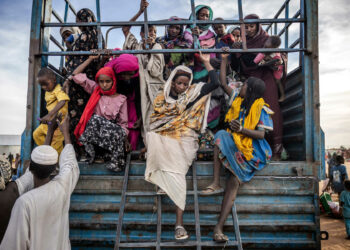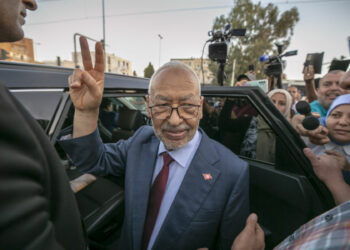Omid Memarian, a journalist, analyst and recipient of Human Rights Watch's Human Rights Defender Award, is the Director of Communications at DAWN.
In an interview with DAWN, Gary Sick, who served on the United States National Security Council of three administrations, discusses the incoming Biden Administration's foreign policy challenges in the Middle East.
عربی
Solving the crisis in Yemen will be at the top of Biden's agenda in the Middle East, said Gary Sick, in an interview with Democracy for the Arab World Now (DAWN).
Sick also said that he expects the first months of Biden's tenure will be punctuated by the quiet release of imprisoned human rights advocates in Saudi Arabia. However, he was pessimistic about the prospects of the new Administration attempting to hold accountable Jamal Khashoggi's murderers.
Gary Sick previously served on the U.S. National Security Council under the Ford, Carter and Clinton administrations. In the Carter Administration, he was the principal White House aide for Persian Gulf Affairs during the Iranian Revolution and hostage crisis. He is now an academic, foreign policy expert, and Middle East analyst at Columbia University.
Excerpts from the interview follow:
DAWN: Given the wave of normalizations of relationships with Israel, to what extent is Biden able, or willing, to reverse Trump's disruptive policy in the Middle East?
Gary Sick: It's going to depend on several things. First, it's going to depend on how Iran responds. Biden intends to rejoin the JCPOA [Joint Comprehensive Plan of Action], and he is proposing a compliance agreement to make Iran bring itself into compliance with the JCPOA. And the United States will do the same thing.
The Arab States in the Gulf have been hoping that the United States would take care of their dirty work for them. The danger of the Gulf States going it alone is that they, particularly Saudi Arabia and the UAE, have seen what Iran could do during the attack on the oil facilities [in Saudi Arabia] and realized how vulnerable they are despite all of their arms. And that Iran has a set of tools at its disposal, which are quite impressive in terms of cruise missiles, and are very hard to stop. You can eliminate some of them, but it's difficult to shoot down all of them. And, for instance, if you look at Dubai, it's completely unprotected. It's just a very short flight from Iran, and a flight of cruise missiles coming at Dubai from a variety of different directions, or at Abu Dhabi for that matter, could do tremendous damage.
That would undercut all of the efforts that the UAE has made to become an international hub.
DAWN: How will the Biden administration's policy be different from what we witnessed during the Trump administration regarding the Yemen crisis?
Gary Sick: If I read him correctly, Biden has strongly opposed the idea of the war in Yemen. I think that's going to be the first sticking point. The Trump administration used all of its influence to maintain arms sales to Saudi Arabia and not back away entirely from the Yemen war. Still, it took a lot of doing because Congress became unhappy with it, as they don't want any American role. So if Biden does step in, then I think he's going to have a very serious conversation with King Salman, and probably with MBS, about the extent to which the United States is willing to support the Yemen effort. He will encourage the King to find a diplomatic solution for the war that will get Yemen back to a normal state.
Clearly, the Saudis are not going to walk away from Yemen. They've got too much invested, but I don't think they're going to be surprised if that conversation takes place. It is overdue, and they've seen it coming. And that's why they are, rather more actively, looking at peace negotiations than they were in the past. It's certainly clear that the Houthis see themselves in much the same position as the Taliban in Afghanistan.
DAWN: American arms are killing Yemenis in Yemen. Is that enough for the U.S. to rethink its policy towards arming Saudi Arabia and providing diplomatic backing?
Gary Sick: Well, I'm sure on the inside, it looks more complicated; but the bottom line is: if the United States, the British, and the French stopped providing logistics support, all of the maintenance of the aircraft and replacements for military equipment, the writing will be on the wall for the Saudis, that they can't do that for themselves for long. The United States will have some very significant influence. They can say, look, "we're prepared to support you in your negotiations, but if you don't negotiate in good faith, we really can't stick with you with all of the things we're providing." In terms of the regular supply of spare parts, there's a lot that is extremely important in war: replacement, munitions, and new weaponry. The logistics support, plus hundreds of technical personnel who are there to maintain and take care of everything, is all being done by foreigners. So the United States has a tremendous amount of influence if it wants to use it.
DAWN: In reaction to the killing of Jamal Khashoggi, President-elect Biden said that "they [Saudi Arabia] will be punished" and that he would make it very clear that "we are not going to sell more weapons to them." With the ongoing human rights violations that we see in the Kingdom and the Yemen crisis, will the US stop selling arms to Saudi Arabia and demonstrate Washington's discomfort and dissatisfaction with Saudi policy?
Gary Sick: What I would anticipate is that it's not going to be the Americans saying, "get it fixed, release all of your prisoners, or we're going to stop providing military equipment." I don't think that's going to happen. I do believe that it will start with Yemen.
The Saudis have read the same reports you've read, and they're very much aware that Biden will be coming with a different set of interests that they're going to have to take into account. I would anticipate that in the first month or two of Biden's administration, the Saudis will quietly release many political prisoners. A lot of things will begin to happen that weren't happening before. Will it be everything? No, probably not, but I think they will see the writing on the wall, and they will take some preemptive action to keep the United States from really pushing it too hard. Then there will be a period of negotiation. Some of the Saudi armed supply orders will be held up, waiting for more action on the Saudi part.
MBS was assured that Trump has his back. He will have every reason to fear that will change. His attitude will be considerably different than it is now.
"Would the Biden administration change course and limit the support they provide for countries like Egypt, the UAE, and Saudi Arabia, leaning more towards human rights principles and the principle of "do no harm" than Trump or even the Obama administration?"
Gary Sick: Yes. It's a matter of degree. From having watched U.S. policy in the Middle East for over half a century, I'm hard-pressed to be enthusiastic. Obama came in with a very clear set of ideas about democracy. George Bush had gone through the whole democracy-building business. They were both over-ambitious, or at least they both failed to change circumstances dramatically. Obama tried to operate by persuasion, which had some success, but let's face it, he didn't succeed in getting the job done. Biden's going to be somewhere in between.
DAWN: Joe Biden can quickly release the classified U.S. government documents related to the murder of Jamal Khashoggi. Would he do this simple act to help hold MBS accountable for his role in the murder?
Gary Sick: Biden is very likely to use that intelligence as a leverage point to persuade the Crown Prince that he would be very wise to cooperate. Also, there are steps you can't undo in the case of Jamal, and that's not to say that you forget about it, but it is to say that you can't reverse history. I don't think Biden is going to come in with the idea of throwing out the Crown Prince and getting involved in the internal aspects of the royal family. That would surprise me very much. It's not Biden's style, and it's a losing game, ultimately, because whatever you think about the MBS, he wouldn't go quietly.
Biden is going to be coming in with a set of objectives. I think Yemen will be at the top of that list, and maybe political prisoners will be at the top of that list in terms of opening up Saudi Arabia.
We would probably be advised not to try to go in and play kingmakers in Saudi Arabia. Biden's going to be judicious. I think the relationship is going to be cooler. Trump's position was pretty transactional; you just spent tremendous amounts of money in the United States to create jobs and buy arms… and that's our bargain. I don't think Biden will reject that model completely, but he's going to demand a much higher price.
* Theodore Nappo and Jack Steele contributed to this interview.







